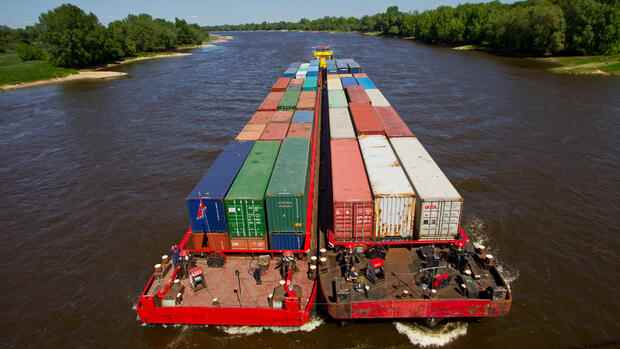According to the draft budget, the funds for replacement, expansion and new construction measures on the federal waterways should actually fall by a third in the coming year. If it is more than 900 million euros this year, the Federal Ministry of Finance plans for 2023 an approach of less than 600 million euros. In 2021, 656 million euros were installed.
The deputy chairwoman of the budget committee, Bettina Hagedorn (SPD), therefore speaks of a “clear cut”. At the beginning of the week she visited the busy Kiel Canal, which is partially closed due to damage to the embankments and has been in need of renovation for years.
Will inland shipping become a climate saver?
The Greens are also open. “The waterways in Germany are a cornerstone for the climate-friendly transport of goods, which has been worn out for decades,” emphasizes the budget politician Paula Piechotta. Because of the “saving rounds”, transports on waterways “like freight transport on rails are becoming increasingly unreliable and thus not only endanger compliance with climate targets in transport, but also economic performance in Germany”.
The Greens have so far advocated not altering natural watercourses. Piechotta is now calling for projects to be prioritized. “With its drastic cuts, the transport minister’s draft points in the completely wrong direction. It jeopardizes the timely completion of urgently needed waterway projects.”
Top jobs of the day
Find the best jobs now and
be notified by email.
>> Also read here: The level of the Rhine continues to fall – transport costs rise
For a long time, inland navigation operators have been calling not only for locks and weirs to be renovated, but also for them to be expanded in order to be able to operate longer ships with greater capacity. On the Neckar, for example, there have been corresponding projects for more than ten years, but little has happened. Locks and weirs are now so dilapidated that they first have to be secured – and Minister Volker Wissing (FDP) no longer wants to talk about an expansion.
Since the last low water in 2018, the federal government wants to accelerate the optimization of the fairway on the Middle Rhine and Lower Rhine for transport shipping on the largest river, the Rhine. The federal government had agreed on this with industry, since the industrial companies based there use the mode of transport.
But the fast fairway expansion does not take place. On the contrary: “Companies in the chemical industry are very concerned that the unloading optimization in the Middle Rhine will not be implemented before 2030 as promised, but not even before 2033,” said Tilman Benzing from the Chemical Industry Association. “The federal government should tackle the project with all vigour, and use every opportunity to speed up the process.”
It’s about 20 centimeters that the Rhine should be deepened at the bottlenecks. From the point of view of shipping, an even fairway would have the advantage that it could be used longer and more evenly, even at low tide. The environmental association BUND, on the other hand, rejects the project.
Ships are sometimes only allowed to load a third
The chemical company BASF in Ludwigshafen, for example, is closely monitoring the situation. The water level at the central point in Kaub is only 48 centimeters. This means that some types of ship can no longer sail, others can only load a third. BASF no longer rules out having to scale back production like in 2018. Accordingly, there is a high expectation that deepening will come soon. “Now the major project needs to be implemented quickly without further delays,” said a spokeswoman.
>> Also read here: Low water threatens coal supply for Uniper power plant
The traffic policy spokesman for the FDP parliamentary group, Bernd Reuther, recommends adjusting the river bed as much as possible as part of the regular work on the Rhine. “In this way we achieve 80 percent of the same effect and do not need the time-consuming approval process,” he told the Handelsblatt.
In view of the low water, rivers such as the Elbe cannot be navigated at all in summer, according to the Federal Association of German Inland Shipping (BDB). “The Elbe is in the same condition as it was in 1937,” said President Martin Staats. Accordingly, it is not possible for shipping to deliver oil to East Germany and thus compensate for bottlenecks all year round in the event of a possible delivery stop through the Russian Druzhba pipeline. The industry had to dispel corresponding considerations by the federal government in the spring.
Demand for coal and grain freight has also been increasing for months. However, ship space is scarce, especially at low tide. “We expect a hot autumn for shipping,” said Staats. The system relevance of the mode of transport has now been recognized.
The BDB complains that 24 river development projects have been decided by the federal government since 2016 and “to date, however, have hardly got beyond the first planning stage and are decades away from construction or even from commissioning.” Another problem is that the responsible water and shipping administration finds it difficult to find staff in the highly competitive market for civil engineers.
VCI infrastructure expert Benzing called for the project company of the federal and state governments, the Deges, to be used in a similar way to the motorways. “In view of the staff shortages, it would be worth considering whether the federal government would use a company for the project in order to be able to pay employees outside of the public tariffs.”
More: 13,000 motorway bridges have to be renovated – the federal government does not manage 100 a year
